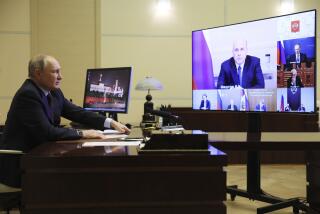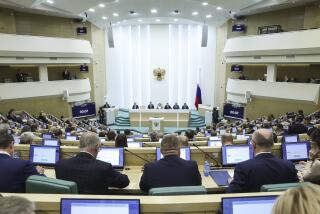Dancing Around a Test Ban : Danger be damned: Some nuclear powers have angled for every advantage
- Share via
Scrambling for footing on the moral high ground, French President Jacques Chirac promises to “spare no effort” to secure an international treaty to “definitively” end all nuclear testing. Well, why not. France has just finished setting off six nuclear devices in Polynesia, Chirac has proclaimed that “the security of our country and our children is assured” thanks to those tests, and this week he is visiting Washington, where the Clinton administration has been pushing hard for a comprehensive nuclear test ban treaty. What better moment to forthrightly recognize the need to spare the environment the dangers that nuclear tests expose it to.
The French testing program was ended early, two blasts short of its initially announced goals, in the face of broad condemnation from countries in the Western Pacific as well as from some of France’s closest European neighbors. Last August President Clinton announced he was making permanent the freeze on U.S. nuclear testing. Russia has avoided test explosions in recent years, as has Britain. With Chirac’s pledge, only China is left among the so-called recognized nuclear powers as still inclined to conduct tests. On Tuesday, after the French announcement, a spokesman in Beijing made clear that China in fact plans to go on testing, at least until an international test ban treaty “comes into force.”
There’s a good chance that a comprehensive test ban treaty can be ready by the end this year, perhaps as early as September. For the last two years 38 nations have been negotiating in Geneva toward that goal. But a gap of unknown duration is likely between when a treaty is ready for signatures and when it actually “comes into force.” China conducted two underground tests last year and it is believed to be preparing for more. Given China’s view on when a test ban treaty would have the force of international law, it seems ready to go on testing to improve its nuclear arsenal until the last possible moment. France was persuaded by international anger to cut short its testing plans. China, unhappy experience suggests, is much less likely to be similarly influenced.
More to Read
Sign up for Essential California
The most important California stories and recommendations in your inbox every morning.
You may occasionally receive promotional content from the Los Angeles Times.










